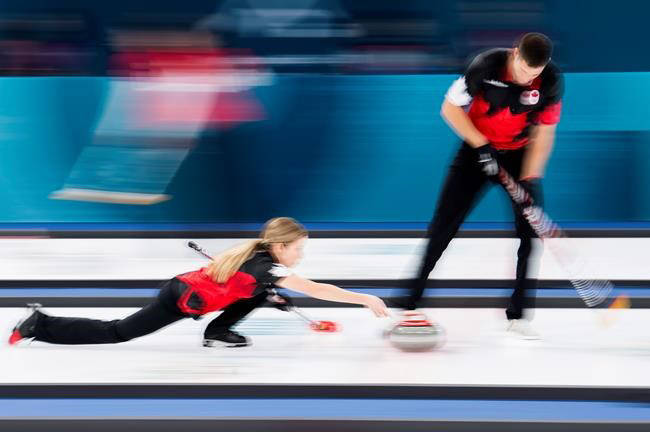The Pyeongchang Winter Olympics don’t officially open until Friday but a couple of Canadians were already in competition mode Thursday.
Doubles curlers John Morris and Kaitlyn Lawes opened the Games with a disappointing 9-6 loss to Norway’s Kristin Skaslien and Magnus Nedregotten before rebounding with a 6-4 win over Americans Becca and Matt Hamilton.
The event is making its debut in Pyeongchang, and despite Canada’s curling dominance, the country isn’t considered the gold-medal favourite.
Both Ottawa’s Morris and Winnipeg’s Lawes are Olympic gold medallists in curling but they had little experience playing mixed doubles together prior to winning January’s trials.
Wednesday’s games came down to tight finishes. The Norwegians stole two in the eighth end to seal the victory in the opener, while Morris needed to place a perfect draw to the button in the final end in the win over the United States.
“Obviously wanted to start off with a win, but it’s a long week thankfully,” said Lawes. “We’ll come back stronger.”
Lawes said she and Morris had “a couple key misses here and there.”
“If we can turn those full misses into at least half shots then we’ll have a little bit more success,” she added.
Morris said he and Lawes are still figuring out the ice.
“The ice was nice and consistent, but I have to make sure I throw to my tolerance a bit more so that if I do miss, it’s not a killer miss,” he said.
FOLLOW: For all Black Press Media Olympic coverage click here.
Morris, 39, won Olympic gold in 2010 playing third for Kevin Martin. Lawes, 29, won gold in 2014 as vice for Jennifer Jones.
“To be able to slide over the Olympic rings and to feel as though we’re part of something historic is really powerful and special,” said Lawes. ”It’s something I’ll never forget. I’m really proud and honoured to be a part of this.”
Also on Thursday, former NHL veteran Chris Kelly was named captain of Canada’s men’s hockey team.
Kelly, who helped the Boston Bruins win a Stanley Cup in 2011 and most recently played with the Ottawa Senators, will be tasked with leading Canada in its quest for a third straight Olympic men’s hockey title.
“Such a great honour,” Kelly said. “And very humbling. There’s so many great people in that locker room who could ultimately be wearing it. It’s a thrill.”
Meanwhile, Canada’s Manuel Osborne-Paradis posted the fastest time in the first Olympic downhill training session.
Osborne-Paradis, from Invermere, B.C., finished in one minute 40.45 seconds in breezy, sunny conditions at the Jeongseon Alpine Centre. He’s making his fourth appearance at the Winter Olympics.
Norway’s Kjetil Jansrud was second in 1:40.76 and Switzerland’s Mauro Caviezel was third in 1:40.90.
Additional training sessions were scheduled for Friday and Saturday ahead of Sunday’s race.
In ski jumping, Calgary’s Mackenzie Boyd-Clowes advanced to the competition phase of the men’s normal hill competition, placing 23rd in qualifying with a score of 114.6. Germany’s Andreas Wellinger led all jumpers at 133.5 points.
Outside competition, the norovirus outbreak at Olympic venues continued to threaten the Games. The number of confirmed cases grew to 128 by Thursday evening, with 42 new instances.
None of the cases are athletes, and the COC said no Canadian staff members have been affected.
“(Athletes have) trained eight to 12 years for this one moment in time when they can prove and perform, and of course it’s a tragedy if they get derailed by injury or illness. A lot of focus has been on injury coming into the Games, but an illness can derail you the same way,” Canadian Olympic Committee medical director Dr. Bob McCormack said.
And Canada’s Olympic team apologized, sort of, for a reported spat at a cafeteria between a Canadian and a Russian.
COC executive director of sport Eric Myles did not reveal whether the Canadian involved was an athlete, coach or support personnel, or exactly what was said.
“It’s an incident, a cafeteria discussion that happened earlier in the week,” Myles said. ”This morning we had an opportunity to have a discussion between the two organizations and everything is OK.
“We said ‘Hey, if something happened, we’re sorry.’”
The Canadian Press



